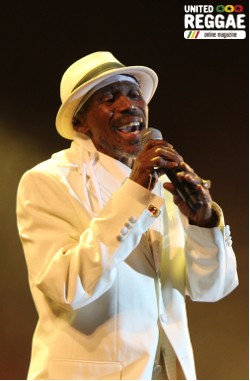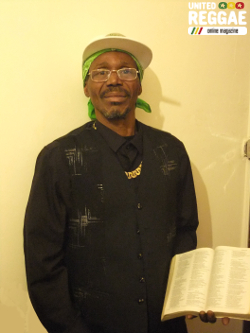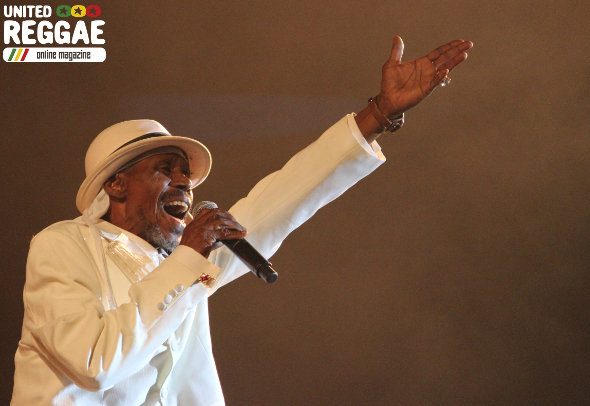Articles about reggae music, reviews, interviews, reports and more...
Interview: Errol Dunkley
- Home
- Articles
- Interviews
- Interview: Errol Dunkley

Interview: Errol Dunkley
"I've got a new album I'm working on - with Sly and Robbie"

As the French crowd will discover later, Errol Dunkley is an artist with a unique voice. Even Jamaica’s very elite, including Dunkley’s old colleague and business partner Gregory Isaacs had forebears - “the original Mr cool ruler” Jackie Edwards - and imitators. Yet who could copy Errol’s bewitching midnight peel – like a brandy laced with honey – all fruitiness, graininess, mystery and hush? As the man sang on two killer cuts of the same song, about his childhood rivalry with the heavily imitated Dennis Brown, “every man do his thing a little way different”.
Physically, Errol is small in stature. When he first tasted the entertainment industry he was smaller still. As a boy his mother used to stand him on the bar of her Kingston drinking establishment to dance as patrons ‘punched’ the jukebox. “That’s how I used to go and hustle my money. I would dance and people would pay me.”
Errol entered the singing business very young - voicing for Prince Buster aged just 11. It wasn’t until his late teens, when the fast ska beat was decelerating to rocksteady, that he had a hit - 1967’s You’re Gonna Need Me for Joe Gibbs. “Yeah that’s when the music changed” he recalls “Because I came in the music on the tail end of ska. Then the ska changed to rocksteady.”
 Bunny Lee said 'Listen, they are saying in England that the music too slow. So we are going to have to move up the tempo a bit'
Bunny Lee said 'Listen, they are saying in England that the music too slow. So we are going to have to move up the tempo a bit'
The person who brought Errol to Gibbs was another budding freelance producer - Bunny Lee. Delroy Wilson had recently become the island’s first child star, over at Coxsone Dodd’s Studio 1. Gibbs, recently returned from Cuba, was looking for a youngster to follow in Wilson's footsteps. Their resulting session generated the cover of Barbara Lynn’s You’re Gonna Need Me – a caustically confident prediction that the teen boy’s lover will realize her mistake and return. The following year Gibbs released two further successes with similar melodies: the scathing Please Stop Your Lying and the wistful, more positive I’m Going Home.
By 1968 rocksteady was giving way to a new beat in town: the reggae. As someone around the studios, Errol must have an insider’s perspective on who created reggae first?
“The reggae beat was like this” is his response, “we were doing rocksteady and people like Bunny Lee and those guys were going to England taking over material and licensing to Trojan, Creole Records and many other record companies. But they said the music was kind of too slow so Bunny Lee came back to Jamaica and said ‘Listen, they are saying in England that the music too slow and they are calling it reggae. So we are going to have to move up the tempo a bit’”.
So would he say Bunny Lee invented the fresh sound? Bangarang by Stranger Cole and Lester Sterling was the first reggae? Not Larry Marshall’s Nanny Goat at Studio 1? Or Say What You’re Saying by Monty Morris for Clancy Eccles?
“No” he laughs “I can’t say for sure but I remember Bunny Lee coming from England and saying ‘Our music, they are calling it reggae!’”
Errol fell out with Joe Gibbs and in 1969 switched to Studio 1 Records at 13 Brentford Road – home of original juvenile sensation Delroy. However, the magic of “The Jamaican Motown” didn’t work for Errol. “Leroy Sibbles took me to Studio 1 but I never had any success with Studio 1. I just did a ton load of songs that never went anywhere!”
 Gregory and I were in the street, trying to make a name
Gregory and I were in the street, trying to make a name
During that period he had struck up a friendship with a fellow emerging singer who possessed a haunting seductive voice – Gregory Isaacs.
“Gregory and I were in the street, trying to make a name, singing for various producers. Gregory was with Rupie Edwards at the time and I was freelancing, singing for every promoter and every producer.”
It was Gregory who took Errol to Edwards – resulting in a popular “3 in 1” medley of You’re Gonna Need Me, Please Stop Your Lying and I’m Going Home sandwiched on a reggae rhythm.
Gregory and Errol decided they should partner for their own label – African Museum – which yielded one of the latter’s enduring favourites, an adaptation of Delroy Wilson’s I Don’t Know Why entitled Movie Star.
“We had Movie Star, Look Before You Leap, My Only Lover and that was the beginning of the thing.”
But Errol never sat still recording in any place for long. In West Kingston he met the one-legged, politically connected producer Jimmy Radway. Radway had penned a lyric with a similar theme to Movie Star – Black Cinderella.
“At the time I was working with Gregory and Jimmy had some songs that he had written. But his writing was like writing poems – it wasn’t like writing songs. Because you know a song is different from writing a poem. You have to write a song to keys and bars – four beats to the bar. Four bars make one verse. Eight bars make two verses. So we had to show Jimmy that a song is different from a poem. I converted the Cinderella. I wrote new lines to it to get the measures right.”
Once amended, Cinderella was transformed into a princess. Errol’s nocturnal timbre felt perfectly suited to Radway’s dark and moody backings and the single became another hit. Unfortunately he and Jimmy quarrelled before they could record the next composition Hell and Sorrow (“Because Jimmy and I fall down. Jimmy and I fell out and that was it”). Alton Ellis’ sister Hortense stepped in to do it instead.
Errol would soon start producing artists himself. In the process he helped future dancehall king Gussie Clarke get a start in the craft when he gave the 18 year old his first rhythm in return for an amp.
“Yeah, Gussie Clarke. I remember I bought out Gussie Clarke’s sound system when he wanted to come in the music business. I bought out his sound and I licensed two riddims to him which he had Big Youth on. “A Mr Tippa Make You Rock So” – that was a song I produced with an artist but it wasn’t big and it never got anywhere so I gave Gussie Clarke a cut from that rhythm.”
Errol then makes a bold claim regarding Gussie’s biggest early album that stops us in our tracks. “I produced the Screaming Target for him with Big Youth. Which he never gave me no credit for.” He laughs “But that’s how it goes.”
Errol was going places anyway. He hopped on a plane to London.
 Jimmy had some songs. But his writing was like writing poems – it wasn't like writing songs
Jimmy had some songs. But his writing was like writing poems – it wasn't like writing songs
“I had a contract to go to England in the 70s and started working for Shelly Recording company and did a ton load of songs.”
One of the London recordings was a recut of a track sung seven years earlier for pioneering female producer Sonia Pottinger. Its name was Little Way Different and it had been written in response to comparisons to Dennis Brown, the child crooner who followed Errol like he did Delroy. The update was anchored by Bajan-born Londoner often credited as popularising Lovers Rock – Dennis Bovell. Bovell’s dubby, stalking backdrop with its twinkling, submarine sonar keyboards made the obscurity into a smash (although Pottinger’s original is arguably as good).
“Little Way Different was a track I did from my first album” is Dunkley’s assessment. “I went to England and I met Matumbi and Dennis Bovell and he said this was an Errol Dunkley he liked from the first time he heard the album from Jamaica so he decided to do it again. It was a major success. Because when I first did it, it was just a track on an album.”
By now Errol had conquered the UK and JA reggae charts. But when he returned to JA in 1979 he would taste international fame with his biggest ever seller – a chirpy cover of the late John Holt’s OK Fred. “I went back home after the thing, did recording with Sly and Robbie – and that’s when I found the OK Fred”.
Although OK Fred got released by Ossie Hibbert it was in fact one of many Dunkley self-productions leased out to another imprint. Earlier in his career Darling Ooh was licensed to Rupie Edwards and You’ll Never Know to Mrs Pottinger. “True, true. All these songs are mine. So much songs.”
Vitally, he learned to register his music with the PRS and keeps a firm hand on his publishing.
“Right now I’ve got my own publisher which is Paul Rodriguez Music in England and they deal with my publishing. They’re a good publishing company and I’ve been working with them for years.”
OK Fred solicited an appearance on Top of The Pops and was huge in France. Yet Errol hasn’t experienced French audiences often.
“I love France. I had a contract with a company in France – Celluloid – Blue Moon? So I used to come to France but I never did any live shows. It was just paper interviews, radio interviews, TV interviews, but I never did any live performance”.
As time is running out we stop talking about the old days. Errol has been recording for Reading, England’s Reality Shock Records. In 2013 they redid his 1983 12” You’ve Been Bad as a joint release with Reality Chant from New Zealand. “Reality Shock they decided to release some of my original products and I gave them the rights to do that. And it’s going fine. I’ve got an album with Reality Shock – I’ve got a cut of it.”
He’s also had a strong influence on the younger wave of roots artists in Jamaica. Protoje sampled Black Cinderella bringing Dunkley to the next generation of reggae fans.
 “That’s right. Plus Mr Vegas did over my You’re Gonna Need Me.”
“That’s right. Plus Mr Vegas did over my You’re Gonna Need Me.”
And when he’s finished touring he has an exciting new project in the works – with a very special duo.
“At the moment I’m touring the world because the world hasn’t seen me yet. And I’ve got a new album I’m working on at the moment. I should complete this album later this year - with Sly and Robbie”.
Before we go, a slightly controversial question. In 1977 he recorded the 45 True To Your Man for John Dread Records. In it he tells his woman “You should stay at home and mind the baby”. Ever since You’re Gonna Need Me and Please Stop Your Lying Errol has been forthright when addressing the ladies - did he catch any flak from feminists for saying that?
Errol laughs a wheezy laugh “This song is of experience. It’s a true song. People will say I’m like a… what they call it? A man who is sceptic of woman?”
“But I’m not really like that.” He continues with a smile “But the song profiled me like that so I just work with it!”
 I produced Screaming Target with Big Youth
I produced Screaming Target with Big Youth
That night Errol, dressed in a sharp white suit and backed by a super-group of France’s Homegrown Band augmented by the UK’s Matic Horns, turns in the undisputed performance of the festival. The tunes we discussed – Black Cinderella, Movie Star, OK Fred – are rendered in such an incredible voice you’d never guess he had a cold. Only when you check the photos can you see the strain on his face to reach the notes.
Read more about this topic
Comments actually desactivated due to too much spams
Browse by categories
Recommended Articles
Latest articles
Recently addedView all
© 2007-2026 United Reggae. All Rights Reserved. Reproduction in whole or in part is prohibited. Read about copyright
Terms of use | About us | Contact us | Authors | Newsletter | A-Z















